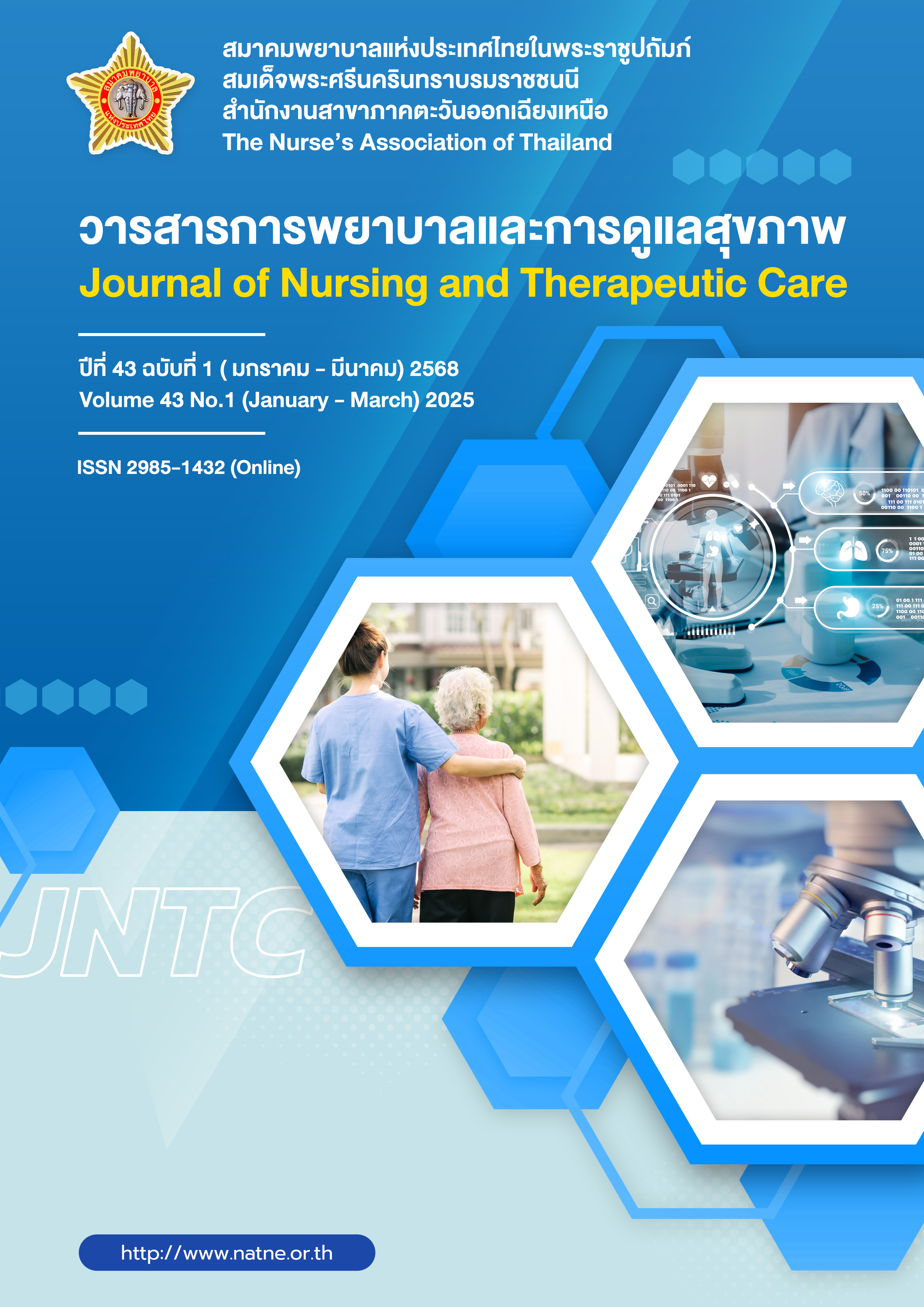[RETRACTED ARTICLE]การพยาบาลผู้ป่วยเสพติดเฮโรอีนที่มีภาวะเสพติดหนัก โดยการให้การปรึกษารายบุคคลตามแนวคิดการพิจารณาเหตุผล อารมณ์ และพฤติกรรม: กรณีศึกษาเปรียบเทียบผู้ป่วย 2 ราย [20 June 2025]
คำสำคัญ:
เฮโรอีน, ภาวะการเสพติดเฮโรอีนหนัก, แนวคิดการพิจารณาเหตุผลอารมณ์และพฤติกรรม, กรณีศึกษาเปรียบเทียบบทคัดย่อ
"retracted due to an ethical violation in accordance with COPE guidelines."
Downloads
เอกสารอ้างอิง
Ukranan W. Methadone maintenance treatment in opioid-dependent individuals: A literature review. Journal of the Department of Medical Services. 2017;42(2):116-21. (in Thai)
Athan P, Somprasert C, Bunthumporn N. The Effects of a psychosocial rehabilitation program on the quality of life of addict patients. The Journal of Psychiatric Nursing and Mental Health. 2019;33(2):61-75. (in Thai)
Ardame A, Bassaknejad S, Zargard Y, Rokni P, Sayyah M. Examine the relationship between mindfulness and drug craving in addicts undergoing methadone maintenance treatment. Iran J Public Health. 2014;43(3):349.
Thanyarak Pattani Hospital. Medical records and statistics. Annual Report of Thanyarak Pattani Hospital. 2022. (in Thai)
National Drug Treatment and Rehabilitation Information System, Ministry of Public Health. [Internet]. 2022 [cited 2022 Mar 15] Available from: https://antidrugnew.moph.go.th/Identity/ STS/Forms/Account/Login.. (in Thai)
Rattanakornpreeda P, Paileeklee S. Quality of life in drug-dependent patients: a study in Songkhla Province, Thailand. J Med Assoc Thai. 2017;100(12):1325-30. (in Thai)
Saengchanchai P, Kittirattanaipiboon P, Renuwattananon A, Kinnara P, Chooklaew R, Rattanasumawong W, et al. Psychosocial and community-based treatments. In: Kanlayasiri R, Rungnirund T, editors. Guidelines for managing substance use problems. Bangkok: Chulalongkorn University Press; 2015. p. 91-114. (in Thai)
Moonjuntee T, Waechuna A, Chaiyakul N. Effects of group counseling based on Rational Emotional Behavior Therapy (REBT) on craving control among heroin-dependent patients. Journal of the Department of Medical Services. 2019;44(5):145-9. (in Thai)
Rao R, Agrawal A, Ambekar A. Methadone maintenance treatment under National AIDS Control Programme: Practice guideline. National Drug Dependence Treatment Centre (NDDTC), AIIMS, New Delhi. 2017.
World Health Organization. Clinical guidelines for withdrawal management and treatment of drug dependence in closed settings. WHO Regional Office for the Western Pacific; 2009.
American Psychiatric Association. DSM-5-TR online assessment measures. Psychiatry.org. [Internet]. 2013 [cited 2022 Mar 15]. Available from: https://www.psychiatry.org.
Black DW, Grant JE. DSM-5® guidebook: The essential companion to the diagnostic and statistical manual of mental disorders Washington DC: American Psychiatric Publishing; 2014.
Wannakam R, Mooljuntee T, Sanseree R, Ditamah F. Nursing practice standards for Heroin patients. In Sanseree R, Jetwaranon A, Jehsoh R, editors. Standards of nursing practice for drug and substance users. Pattani: Mittrapap; 2023. P. 98-128. (in Thai)
Seaback WW. Nursing process: Concepts and application. 3rd ed. Delmar Cengage Learning; 2013.
Wesson DR, Ling W. The Clinical Opiate Withdrawal Scale (COWS). J Psychoactive Drugs. 2003;35(2):253-9.
Dhawan A, Rao R, Ambekar A, Chopra A, Jain R, Yadav D, et al. Methadone maintenance treatment in India: a feasibility and effectiveness report. UNODC (ROSA) and NDDTC (AIIMS). New Delhi, India; 2014. [internet]. [cited 2022 May 18]. Available from: https://www.unodc.org/documents/southasia/
publications/research-studies/MMT_REPORT_final.pdf.
Comer S, Cunningham C, JM, Gordon A, Kampman K, Langleben D, et al. Practice guideline for the use of medications in the treatment of addiction involving opioid use. Am Soc Addict Med. 2015;66:39-42.
Navidian A, Kermansaravi F, Tabas EE, Saeedinezhad F. Efficacy of group motivational interviewing in the degree of drug craving in the addicts under the methadone maintenance treatment (MMT) in South East of Iran. Arch Psychiatr Nurs. 2016;30:144-9.
Thanyarak Pattani Hospital. Guidelines for heroin patients care. Pattani: Clinical Leadership Team, Thanyarak Pattani Hospital; 2021. (in Thai)
Suwanmajo S, Duangrithi D, Komkla N, Phattanachot W, Sathaporn U. Predictive factors for 1-year retention in long-term methadone treatment at the methadone clinic, Princess Mother National Institute for Drug Abuse Treatment. Journal of The Department of Medical Services. 2019;44(4):119-24. (in Thai)
ดาวน์โหลด
เผยแพร่แล้ว
รูปแบบการอ้างอิง
ฉบับ
ประเภทบทความ
สัญญาอนุญาต
ลิขสิทธิ์ (c) 2025 วารสารการพยาบาลและการดูแลสุขภาพ

อนุญาตภายใต้เงื่อนไข Creative Commons Attribution-NonCommercial-NoDerivatives 4.0 International License.



